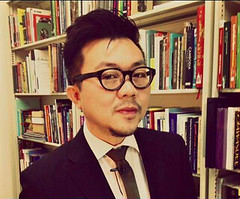Rewriting a history in an intricate business. Nations thrive on extraordinary history. It must be replete with heroism, sacrifices, courage and patriotism. History is employed to reaffirm the longevity of a nation. The longer the life of a nation is, a deeper sense of national belonging it becomes. Given this importance, history is a powerful tool in instigating nationalism. To make a perfect nation, a perfect history is necessary. In the world of nationhood, history tells stories of miracles, achievements and memorable occurrences.

The 23rd prime minister of Thailand being removed from historical textbooks
At the same time, history is a manipulative instrument. Conservative historians may wish to underscores the nation’s impressive tales while burying its embarrassing past moments. A prominent historian Professor Charnvit Kasetsiri, also former rector of Thammasat University, cautioned, “If you know nothing about history, you are one-sided blind. But if you believe in history without any questions, you are totally blind.”
Last week, an article by Thomas Fuller of the New York Times, unveiled the Thai state’s alleged project on rewriting Thai history by deleting from the high-school textbooks Thaksin Shinawatra, the 23rd prime minister of Thailand who had been in power from 2001-2006 until he was overthrown in a military.
So far, education authorities gave conflicting accounts on why details on Thaksin were erased from the Thai historical textbooks. One account was that the Thai political history happened to end only at the government of Chuan Leekpai (1997-2001). Basically, this is the case of the textbooks not being updated. In another account, education authorities admitted not to include Thaksin’s name, but only mentioned the period of political difficulties. Either way, it raises suspicions on the part of the Thai state in purposefully forgetting the Thaksin period, which saw the longest-running elected government in the short political history of the Thai nation.
Forgetting the past represents a trick that cleanses a nation. It is a trick that is designed to hide some inconvenient truths. More importantly, it is a part of adding a layer of legitimacy to the regime of the day. Erasing important figures or political episodes from the pages of history is not an uncommon practice.
The Chinese historical textbooks exclude the Tiananmen massacre in 1989, which killed hundreds, if not thousands, of pro-democracy activists. In comparison, Thai historical books treat with little significance the October 6 massacre of students at Thammasat University in 1976. In both incidents, the remaining of brutal memories only served to bring out the ruthlessness of the despotic regimes of the past. Conservative historians would rather craft a more picturesque history for the people to admire, even if it would leave them in the world of make-believe.
Since Thaksin’s downfall, the former prime minister has continued to cast a long shadow over the present and future of Thai politics. The current coup is a part of eliminating the Thaksin’s influence from the political realm. But Thaksin’s enemies have clearly chosen the wrong approach. Instead of winning back supporters of Thaksin through good policy platforms and via elections, they endorsed a coup as a shortcut to get rid of Thaksin and his proxies from politics.
But the coup will prove to be counterproductive. Thaksin’s supporters see it as yet another attempt to rob them of their electoral rights. Worse, removing Thaksin from the history will also be perceived as removing from their consciousness and recollection their dear prime minister. The forgetful past will not be forgotten. But it will be entrenched even further into some people’s mind.
Falsifying history is just plainly wrong. Loved or hated, Thaksin must earn a place in the Thai history. It is then up to the people to learn from such history, analyzing it, and making their own judgment about some good and bad legacies Thaksin has left behind. Bad history is not necessarily bad. It could provide a lesson for people of later generations. This explains why the European history is full of wars, ethnic animosities, losses of nations, heartless political leaders and mass deaths. Yet, they have made the most out of their bitter past to create an even brighter future for themselves.
For the conservative historians, deleting Thaksin from the people’s memory is much more difficult than they earlier thought. It is even more difficult now, comparing with many decades ago when social media did not exist. Today, people have other channels to learn more about their past without having to rely on a distorted version of history endorsed by the state.
Such alternative histories allow people to check facts, compare events, and give their own critical assessments about past happenings. The state’s manipulation of history will be from this point onwards confined within a new social context. Exploiting national history to create a uniform society will face several challenges. For example, the mysterious “men in black” who were supposedly behind the killing of some state agencies in 2010, have become a controversial topic. A number of people used evidences found on the Internet to question the existence of such men in black. This is how history will be contested from now on.
At the end, Thailand is not North Korea, although the two nations share a myriad of similarities. As an open society, even when it is currently under the military government, Thailand can no longer close down its social space in which differences must be tolerated. History is a larger social space in which national heroes or villains deserved their place.

Pavin Chachavalpongpun is associate professor at Kyoto University’s Center for Southeast Asian Studies.

